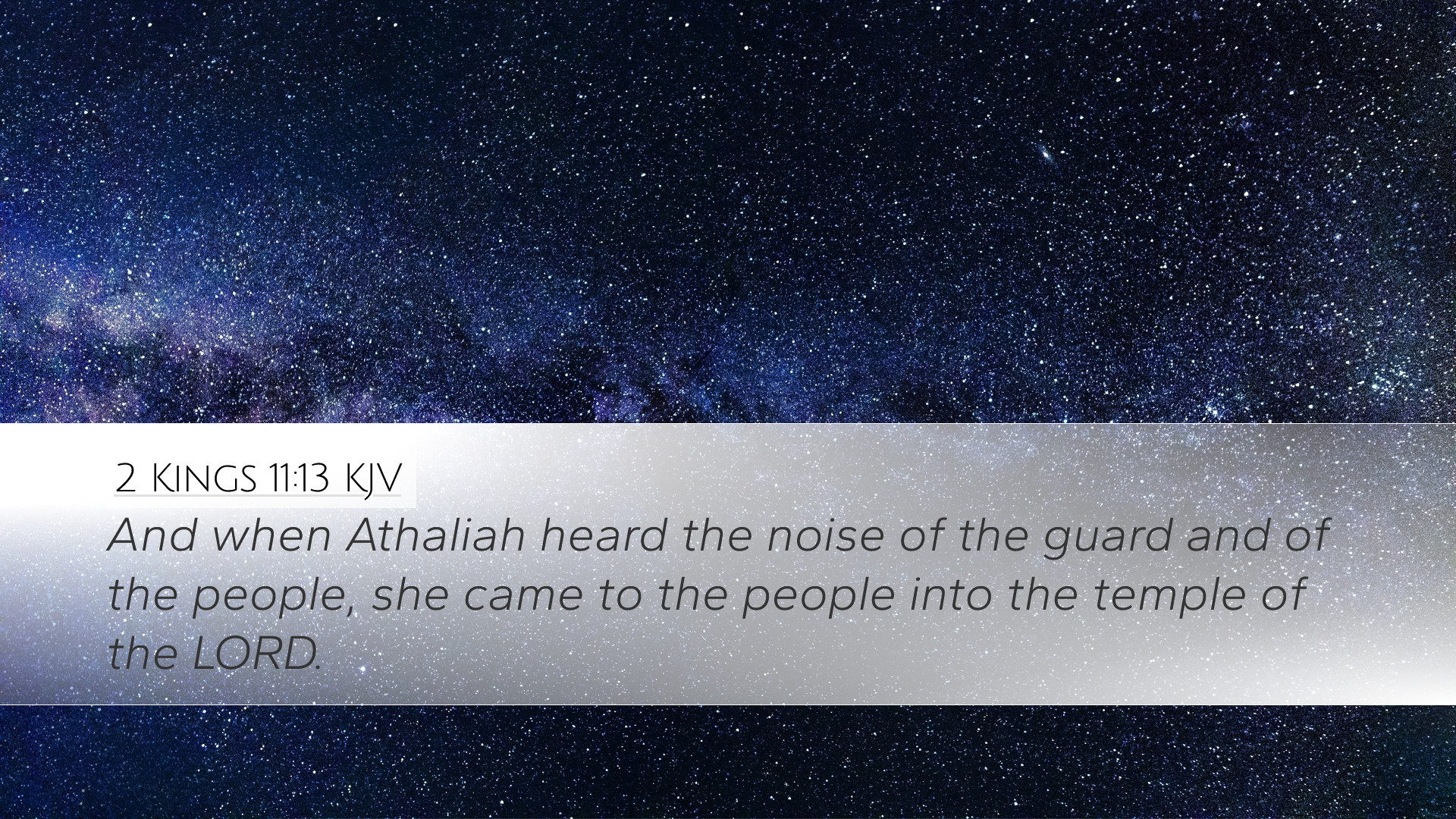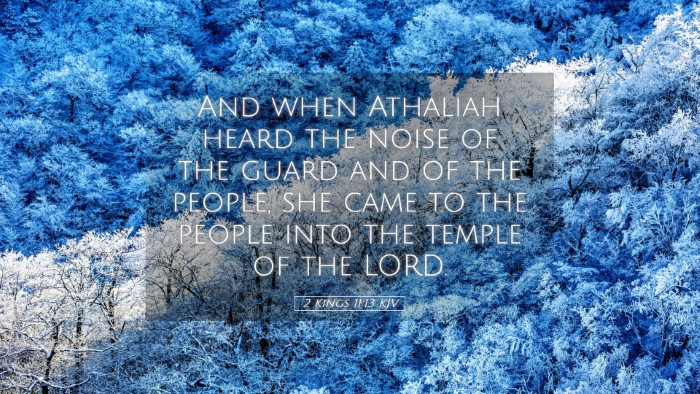Old Testament
Genesis Exodus Leviticus Numbers Deuteronomy Joshua Judges Ruth 1 Samuel 2 Samuel 1 Kings 2 Kings 1 Chronicles 2 Chronicles Ezra Nehemiah Esther Job Psalms Proverbs Ecclesiastes Song of Solomon Isaiah Jeremiah Lamentations Ezekiel Daniel Hosea Joel Amos Obadiah Jonah Micah Nahum Habakkuk Zephaniah Haggai Zechariah Malachi2 Kings 11:13
2 Kings 11:13 KJV
And when Athaliah heard the noise of the guard and of the people, she came to the people into the temple of the LORD.
2 Kings 11:13 Bible Commentary
Commentary on 2 Kings 11:13
Verse Text: "When Athaliah heard the noise of the guard and of the people, she came to the people in the temple of the LORD." (2 Kings 11:13, NKJV)
Introduction
This verse captures a pivotal moment in the narrative of Israel's history during the reign of Athaliah. Athaliah, a usurper queen, represents a dark chapter in Judah's royal lineage. Her reaction to the noise signifies both the alarm of a ruler aware of encroaching threats and the significant shift in the political landscape of Judah.
Contextual Background
The events leading to this moment are critical for understanding the implications of Athaliah's rule. Following the death of her son, Ahaziah, Athaliah sought to eliminate all potential claimants to the throne, including her own grandchildren. This ruthless ambition led her to reign as the sole monarch, a situation fueled by the chaotic political climate and her ties to the corrupt house of Ahab.
Historical Setting
Athaliah's brief reign was marked by idolatry and the persecution of the faithful to Yahweh. She aligned herself with Baal worship, which was a departure from the covenantal obligations of Judah. Her rule culminated in a significant tension between the faithful remnant and her oppressive governance.
Analysis of the Verse
In 2 Kings 11:13, the noise indicates a disturbance significant enough to capture the attention of Athaliah. This noise can be interpreted as a signal of impending change, possibly representing the moment that leads to a substantial overthrow of her rule.
Interpretive Insights
- Auditory Symbolism: The "noise of the guard and of the people" embodies a sense of unrest and a heralding of change. The noise could also symbolize the cries of God's people yearning for restoration.
- Divine Intervention: Athaliah's reaction illustrates a common biblical theme where the rulers are caught off guard by divine plans. This serves as a reminder of God's sovereignty in human affairs.
- Character Analysis: Athaliah is depicted as a formidable yet ultimately vulnerable character. Her presence in the temple signifies the blending of both cultural and religious authority, showcasing her attempt to assert power even in spaces dedicated to Yahweh.
Theological Implications
This verse invites a deeper exploration of the themes of idolatry versus true worship and the providence of God amidst tyranny. Athaliah’s reign can be seen as a representation of the fleshly desires for power which stands against God’s promise of a righteous line through David.
God's Faithfulness
Despite the chaos and the apparent success of Athaliah's brutal reign, God's covenant remains intact. The uprising led by Jehoiada is not merely a political maneuver, but a fulfillment of God’s promise to preserve a remnant in Judah.
Reactions of the Faithful
Amidst the tension in this verse lies a message of hope for the faithful remnant. The guard's actions and the people's response signal a longing for the restoration of rightful worship and leadership.
Commentary Insights
Matthew Henry's Commentary
Henry emphasizes the providential timing of God's intervention. He notes that divine justice often operates even when evil seems to prevail. The noise that Athaliah hears represents the clamor of a people ready for liberation.
Albert Barnes' Commentary
Barnes discusses the political implications of Athaliah's actions. His insight highlights the significance of the guard's presence, indicating a transition from oppression to an organized movement toward reform. He suggests that the noise symbolizes a revival of faith and a collective desire for change.
Adam Clarke's Commentary
Clarke provides a detailed exploration of Athaliah's background, linking her actions to her upbringing and the influence of her family. He points out the irony of her position, noting that the temple was intended as a sanctuary for the worship of the true God, yet it became a stage for her corrupt leadership.
Conclusion
2 Kings 11:13 serves as a critical reminder of God's sovereignty and faithfulness amidst human schemes and sinful rulership. Athaliah's reaction foreshadows the coming change—a testament to the resilience of God’s people and an assurance that regardless of the current situation, God remains in control of history.
Reflection Points
- How does this event reflect the tension between divine sovereignty and human action?
- What can modern believers learn from Athaliah’s determination to cling to power?
- In what ways does this narrative encourage us to trust in God's timing amidst chaotic circumstances?


